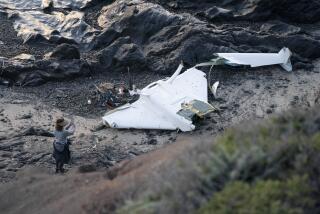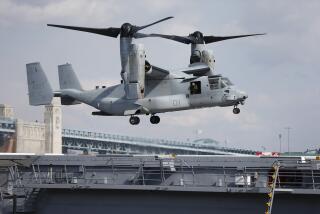Poor Upkeep Blamed in Fatal Emery Jet Crash
Federal investigators on Tuesday blamed shoddy maintenance for the fatal crash of an Emery Worldwide Airlines cargo jet near Sacramento in February 2000.
The National Transportation Safety Board said that improper installation of a bolt had led to a failure of the DC-8’s elevator, which is a flap on the wing-like portion of the tail that controls the up-and-down movement of the plane.
The elevator failure caused the nose of the heavily laden cargo jet to pitch up sharply as the four-engine plane lifted off a runway at the former Mather Air Force Base on the night of Feb. 16, 2000, for a flight to Dayton, Ohio, the NTSB said.
One of the pilots radioed air-traffic controllers that he was having trouble controlling the DC-8. Both pilots pushed forward as hard as they could on their control yokes, but they couldn’t force the nose back down, the NTSB said.
They were trying to return the crippled plane to Mather when it slammed into a junked-auto auction yard and burned.
Killed in the crash were the captain, Kevin Stables, 43, of Berlin, N.Y.; co-pilot George Land, 35, of Placerville, Calif.; and flight engineer Russell Hicks, 38, of Sparks, Nev.
The NTSB determined that, sometime after an earlier takeoff from Reno, the elevator bolt had begun to loosen. As the jet began its subsequent takeoff roll at Mather, the bolt jammed the elevator mechanism in an extreme, nose-up position, rendering the plane uncontrollable.
The bolt had not been properly secured and inspected during previous maintenance, but when and where that happened could not be determined, the NTSB said.
Fourteen months after the crash, another Emery DC-8 crash-landed in Nashville. The NTSB said that accident had been caused by the installation of an improper part in the left main landing gear.
The Federal Aviation Administration then began its own investigation of Emery’s operations, turning up more than 100 apparent violations of safety regulations, many of them relating to maintenance.
On Aug. 14, 2001, Emery’s Palo Alto-based parent company, CNF Inc., agreed to ground its entire 37-jet fleet until the FAA was satisfied that all the shortcomings had been rectified. For several months, the air-cargo operations were handled by subcontractors.
In December 2001, Emery and another CNF subsidiary, Menlo Logistics, merged to form Menlo Worldwide, a firm that no longer flies cargo planes.
More to Read
Inside the business of entertainment
The Wide Shot brings you news, analysis and insights on everything from streaming wars to production — and what it all means for the future.
You may occasionally receive promotional content from the Los Angeles Times.










